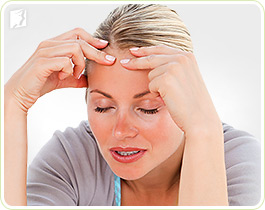Headaches affect most women at some point of their lives, but they can worsen during menstruation and as you approach menopause. This is thought to be caused by the hormonal imbalances experienced during menopause and while menstruating.
Headaches often develop into migraines, which can be debilitating and lead to nausea, vomiting, and severe pain. However, there are options for treatment and prevention available.
When Do Headaches and Migraines Occur?
Headaches can occur at any time in your life, and have a variety of underlying causes. However, many women report that the intensity and frequency of their headaches clusters around two days before menstruation and the first three days during it. Some women experience severe headaches during ovulation as well.
Women experiencing menopause also report that their headaches increase both in number and intensity, especially if they're experiencing sharply unpredictable periods. Women also report experiencing severe headaches during the first weeks of pregnancy and soon after starting a new form of oral contraceptives.
Why Do Headaches and Migraines Occur?

Incidence of migraines during hormone level changes.While scientists haven't found any conclusive connections between a particular hormone and headaches, based on the timing of the headaches, it's agreed that hormonal imbalances are involved in some way. Some scientists speculate that hormonal changes don't cause an attack, only aggravate an existing one.
What Can I Do to Prevent Headaches?
There are a number of options if you are experiencing migraines during menstruation.
The first step is to keep a diary, where you record:
- What days your headaches occur on.
- When you menstruate.
- What foods or drinks you consume prior to the onset of the headache - these may be triggers.
Once you have positively identified the headaches as linked to your menstrual cycle and potentially identified any triggers, you can move on to prevention methods. These include:
Avoid triggers. Alcohol, caffeine, and smoking are just a few examples of common triggers.
Make a sleep schedule. Too much sleep and too little sleep can both be problematic for your body.
Eat regularly. Small snacks throughout the day will keep your blood sugar up and your body healthy.
Drink water. Stay hydrated.
Avoid stress. As much as possible, as the increased tension can trigger a headache.
Massage. Make sure that your body isn't retaining tension somewhere that can trigger headaches, such as from clenching your jaw. Massages can also melt away stress.
What Can I Do to Treat Headaches?
If the above prevention methods don't work and you develop a headache anyway, there are still ways to alleviate the symptoms.
Herbal medicines, such as chamomile tea, are simple ways to help alleviate a migraine. Some women also find over-the-counter pain medication - such as ibuprofen - helpful enough.
Women with severe migraines during menstruation can also talk to their doctors about stronger pain medications. However, these treatments are not for everyone, so it's best to exhaust lifestyle changes and other less invasive methods before resorting to this.
If you are suffering from severe migraines due to menopause, treatments like hormone replacement therapy (HRT) are an option, but you should talk to your doctor about the risks associated with this treatment.
If your headaches are caused by your contraceptive pill, talk to your doctor about changing dosages or switching pills.
To learn more about migraines, follow the link.
Sources
- Better Health Channel. (2014). Headaches and Hormones. Retrieved July 15, 2015, from http://www.betterhealth.vic.gov.au/bhcv2/bhcarticles.nsf/pages/Headache_and_hormones?open
- National Health Service UK. (2015). Hormone Headaches. Retrieved July 15, 2015, from http://www.nhs.uk/Livewell/headaches/Pages/Hormonalheadaches.aspx
